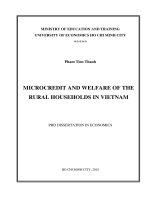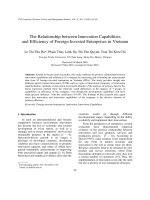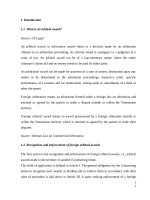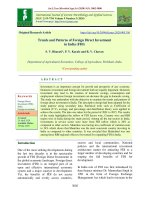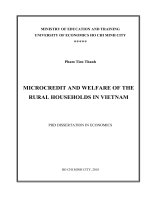(Tiểu luận FTU) RECOGNITION AND ENFORCEMENT OF FOREIGN ARBITRAL AWARDS IN VIETNAM
Bạn đang xem bản rút gọn của tài liệu. Xem và tải ngay bản đầy đủ của tài liệu tại đây (253.17 KB, 21 trang )
FOREIGN TRADE UNIVERSITY
FACULTY OF ENGLISH FOR SPECIFIC PURPOSES
---------***---------
RECOGNITION AND ENFORCEMENT OF
FOREIGN ARBITRAL AWARDS IN VIETNAM
Class: TAN432(1-1920).2_LT
Lecturer: Phan Kim Thoa (MA.)
Group No.10
Members
Student ID
Nguyễn Thị Thái Bảo
1611120018
Trần Anh Khoa
1711110347
Hoàng Anh Phương
1611110464
Nguyễn Thị Thảo
1615510104
Đào Quỳnh Trang
1711110705
LUAN VAN CHAT LUONG download : add
Hanoi, December 24th, 2019
2
LUAN VAN CHAT LUONG download : add
CONTENT
ABSTRACT
3
I. Introduction
4
1.1. What is an arbitral award?
4
1.2. Recognition and enforcement of foreign arbitral awards
4
1.3. Referral by a court to arbitration
5
II. General principles for the recognition and enforcement of foreign arbitral awards in
Vietnam
5
III. Procedures for recognition and enforcement in Vietnam of foreign arbitral awards
7
3.1. Documents
7
3.2. Procedures for considering petitions for recognition and enforcement in Vietnam
of foreign arbitral awards
8
IV. The Weak Enforcement of Foreign Awards in Vietnam
10
4.1. An Overview of the Enforcement of Foreign Awards
10
4.2. The Weak Enforcement of Foreign Awards in Vietnam
10
4.3. Grounds for refusal of recognition and enforcement under New York Convention
11
4.4. Grounds for refusal of recognition and enforcement in Vietnam
14
4.5. Cases in Vietnam
14
4.5.1. Energo Novus and Vinatex (1998)
15
4.5.2. Tyco Services Singapore and Leighton Contractors Vietnam (2003)
16
V. Actions
16
5.1. Actions of Arbitral awards under Vietnam Law
16
5.2. Some notes for foreign arbitral awards in Vietnam
18
REFERENCES
20
3
LUAN VAN CHAT LUONG download : add
ABSTRACT
The choice of arbitration as a means of dispute resolution has many benefits for
individuals, because of its unique procedural characteristics and time savings. However, it
also presents downsides amongst which the enforcement of an arbitration decision,
especially when the decision has not been issued by an arbitration center of Vietnam. In
this research paper, we will try to understand how to execute arbitration awards in
Vietnam, under various circumstances.
4
LUAN VAN CHAT LUONG download : add
I. Introduction
1.1. What is an arbitral award?
Source: US Legal
An arbitral award or arbitration award refers to a decision made by an arbitration
tribunal in an arbitration proceeding. An arbitral award is analogous to a judgment in a
court of law. An arbitral award can be of a non-monetary nature where the entire
claimant's claims fail and no money needs to be paid by either party.
An arbitration award can be made for payment of a sum of money, declaration upon any
matter to be determined in the arbitration proceedings, injunctive relief, specific
performance of a contract and for rectification, setting aside or cancellation of a deed or
other document.
Foreign arbitration means an arbitration formed under a foreign law on arbitration and
selected as agreed by the parties to settle a dispute outside or within the Vietnamese
territory.
Foreign arbitral award means an award pronounced by a foreign arbitration outside or
within the Vietnamese territory which is selected as agreed by the parties to settle their
disputes.
Source: Vietnam Law on Commercial Arbitration
1.2. Recognition and enforcement of foreign arbitral awards
The first action is the recognition and enforcement of foreign arbitral awards, i.e., arbitral
awards made in the territory of another (Contracting) State.
This field of application is defined in Article I. The general obligation for the Contracting
States to recognize such awards as binding and to enforce them in accordance with their
rules of procedure is laid down in Article III. A party seeking enforcement of a foreign
5
LUAN VAN CHAT LUONG download : add
award needs to supply to the court (a) the arbitral award and (b) the arbitration agreement
(Article IV).
The party against whom enforcement is sought can object to the enforcement by
submitting proof of one of the grounds for refusal of enforcement which are limitatively
listed in Article V(1). The court may on its own motion refuse enforcement for reasons of
public policy as provided in Article V(2).
If the award is subject to an action for setting aside in the country in which, or under the
law of which, it is made ("the country of origin"), the foreign court before which
enforcement of the award is sought may adjourn its decision on enforcement (Article VI).
Finally, if a party seeking enforcement prefers to base its request for enforcement on the
court's domestic law on enforcement of foreign awards or bilateral or other multilateral
treaties in force in the country where it seeks enforcement, it is allowed to do so by virtue
of the so-called more-favourable-right provision of Article VII(1).
1.3. Referral by a court to arbitration
The second action contemplated by the New York Convention is the referral by a court to
arbitration. Article II (3) provides that a court of a Contracting State, when seized of a
matter in respect of which the parties have made an arbitration agreement, must, at the
request of one of the parties, refer them to arbitration (unless the arbitration agreement is
invalid).
In both actions the arbitration agreement must satisfy the requirements of Article II(1) and
(2) which include in particular that the agreement be in writing.
Source: New York Convention
II. General principles for the recognition and enforcement of foreign arbitral awards
in Vietnam
- Provisions of the Convention on the Recognition and Enforcement of Foreign Arbitral
Awards done at New York, on June 10, 1958 (New York Convention 1958) are applied in
almost countries for the recognition and enforcement of foreign arbitral awards. After
Vietnam’s accession to the Convention, the National Assembly Standing Committee
6
LUAN VAN CHAT LUONG download : add
passed the Ordinance on Recognition and Enforcement in Vietnam of Foreign Arbitral
Awards at the end of 1995 (the 1995 Ordinance). It took effect on January 1, 1996, and
was Vietnam’s first legal document providing procedures regarding the recognition and
enforcement in Vietnam of foreign arbitral awards. According to that, Vietnam has
announced three following reservations:
1. Vietnam will apply the Convention only to recognition and enforcement of awards
made in the territory of another contracting State; with regard to awards made in the
territory of non-contracting States, Vietnam will apply the Convention only to the extent
to which those States grant reciprocal treatment.
2. Vietnam will apply the Convention only to differences arising out of legal
relationships, whether contractual or not, that are considered commercial under the
national law.
3. Vietnam declared that interpretation of the Convention before the Vietnamese courts or
competent authorities should be made in accordance with the Constitution and the law of
Vietnam.
However, article 21 regulates that: “In cases of international treaties which the Socialist
Republic of Vietnam has signed or acceded to provide otherwise, the provisions of such
international treaties shall apply.”
And until now, in Clause 3, Article 2 of the 2015 Civil Procedure Code regulates that The
Civil Procedure Code applies to the settlement of civil cases involving foreign element(s);
where the international treaties to which the Socialist Republic of Vietnam is a signatory
provide otherwise, the provisions of such international treaties shall apply.
Under the provisions in Article 424 of the 2015 Civil Procedure Code, Courts shall
consider foreign arbitral awards only the following foreign arbitrators’ award shall be
considered being recognized and enforced in Vietnam:
First, on the basis of international treaties
7
LUAN VAN CHAT LUONG download : add
1. Arbitral award of a foreign country which is a signatory to an International treaty about
recognition and enforcement of foreign arbitral award together with Vietnam;
Second, based on the principle of reciprocity
2. Foreign arbitral award other than those specified in point an of this clause on the basis
of the principle of reciprocity. (in cases where Vietnam and such foreign countries have
not yet signed agreements or in which neither of them is contracting states to relevant
international conventions.)
- Parties in favor of whom foreign arbitral awards are invoked have the right to file
petitions with Vietnamese courts requesting the recognition and enforcement in Vietnam
of such awards if the individuals against whom the awards are invoked reside or work in
Vietnam, or agencies or organizations against which the awards are invoked are
headquartered in Vietnam, or the assets related to the enforcement exist in Vietnam at the
time of filing petitions.
- When handling petitions, courts do not examine the subject matter and nature of
disputes but only examine them in terms which are primarily relevant to the validity of the
arbitral agreement and competence of foreign arbitrators and foreign arbitration
proceedings. Upon consideration, Vietnamese courts will render their decisions on
recognition or non-recognition of awards. Involved parties will have the right to lodge
appeals of such decisions in higher courts for review according to provisions of the Civil
Procedure Code.
- Foreign arbitral awards that have been recognized and permitted by Vietnamese courts
for enforcement in Vietnam have a full legal effect like legally effective decisions of
Vietnamese courts and are enforced according to civil judgment enforcement procedures.
- The Vietnamese State guarantees the transfer from Vietnam to foreign countries of cash
and other assets for enforcement of foreign arbitral awards which have been recognized
by Vietnamese courts for enforcement in Vietnam. Such money and asset transfers shall
be carried out in compliance with Vietnamese law.
8
LUAN VAN CHAT LUONG download : add
III. Procedures for recognition and enforcement in Vietnam of foreign arbitral
awards
3.1. Documents
In order to request the recognition and enforcement in Vietnam of foreign arbitral awards,
the parties have to prepare serveral necessary documents known as petition dossier which
includes:
- The petition
- Copy of the foreign arbitral award
- Copy of discrete arbitration agreement
- Other papers and documents
Therein, the copies of discrete arbitration agreement are the copies which constitute part
of the signed contract and other papers and documents provided for in international
treaties to which Vietnam has signed or acceded. Copied documents must be legally valid
and documents in foreign languages must be translated into Vietnamese and lawfully
notarized or authenticated.
3.2. Procedures for considering petitions for recognition and enforcement in Vietnam
of foreign arbitral awards
- Firstly, parties requesting the recognition and enforcement in Vietnam of foreign arbitral
awards must begin with the submission of petitions to the Vietnamese Ministry of Justice.
Within seven days after receiving a petition dossier, the Justice Ministry will forward it to
competent courts (courts of provinces or centrally-run cities according to current
regulations) where the involved parties reside or work or where related assets exist. The
competent court is the court of provincial level in which the award debtor resides (if an
individual) or has its headquarters (if a company or organization) or the place where the
property relating to the enforcement is located.
9
LUAN VAN CHAT LUONG download : add
- Secondly, within three working days after receiving files from the Justice Ministry, the
competent courts must accept the cases for handling and notify individuals, agencies or
organizations against whom the enforcement is sought as well as the People’s Procuracy
at the same level. In this step, the competent courts also notify to award debtor and
prosecuting agencies.
- Thirdly, within two months after accepting the petition (can be extended by another two
months) and examining the case file, the court may decide to:
i)
suspend consideration of the petition in cases of receiving written notice
of the Justice Ministry saying that foreign competent authorities are
reviewing the foreign arbitral award; or
ii)
cease consideration of the petition in cases where the petitioner has
withdrawn the petition, parties against whom the awards are invoked have
voluntarily enforced the awards or have been dissolved or gone bankrupt,
foreign arbitral awards have been set aside or suspended by foreign
competent authorities, parties against whom the awards are invoked do
not reside or work or are not headquartered in Vietnam, or the places
where assets related to the enforcement in Vietnam exists are
unidentifiable; or
iii)
open a hearing to consider the petition within twenty days after issuing
such decision.
- Fourth, within twenty days from the date of the decision, if the competent court opens a
hearing for consideration of a petition, it shall be conducted by a petition consideration
panel composed of three judges in the presence of procurators of the same level, the
petitioner, and the party against whom the award is invoked or their lawful
representatives. The panel can issue a decision on recognition and enforcement in
Vietnam or non-recognition of the foreign arbitral award by majority.
The involved parties may lodge appeals against a court decision within fifteen days after
the court issues such decision or after they receive such decision if they have not been
present at the hearing considering their petition. The procuracies of the same level and the
10
LUAN VAN CHAT LUONG download : add
Supreme People’s Procuracy may protest court decisions within fifteen days or one month
respectively.
- Fifth, The Supreme People’s Court shall review a provincial-level people’s court’s
decision which is appealed or protested within one month after receiving the case files. In
cases where unclear points exist in dossiers and the courts request the involved parties to
make explanations, the said time limit shall be extended but must not exceed two months.
A panel for review of an appealed or protested decision is composed of three judges. A
hearing for review of an appealed or protested decision shall be conducted. The review
panel may uphold or partially or entirely amend decisions of provincial-level people’s
courts and suspend or stop consideration of appeals or protests. The Court will issue a
decision on:
● Recognizing and permitting enforcement in Vietnam; or
● Non-recognizing the award of foreign arbitrators
Decisions of the Supreme People’s Court are final and take immediate effect.
IV. The Weak Enforcement of Foreign Awards in Vietnam
4.1. An Overview of the Enforcement of Foreign Awards
The last few years have witnessed great development of the arbitration legal framework in
Vietnam, particularly regarding the enforcement of foreign awards. Only final arbitral
awards that were not set aside by the foreign country’s Court of the seat of arbitration are
subject to enforcement in Vietnam. The enforcement of such awards must be recognized
and approved by the People’s Court of Vietnam.
Vietnam has, accordingly, engaged in a program of reform of its commercial arbitration
system in order to encourage and attract foreign investors and to address traders' interests.
However, the reputation and history of enforcement of arbitral awards in Vietnam is still a
cause of concern to investors and traders alike. The practice has shown that Vietnamese
courts are unwilling to enforce arbitration awards. Moreover, current Vietnamese
regulations on enforcement of international arbitral awards suffer from a number of
11
LUAN VAN CHAT LUONG download : add
shortcomings, such as inconsistent statutory interpretation, unclear definitions,
overlapping legislation, shortage of trained personnel, etc.
4.2. The Weak Enforcement of Foreign Awards in Vietnam
A significant difference between the Vietnamese courts’ enforcement of domestic awards
and foreign awards. Indeed, Nguyen The Duc Tam and Nguyen Thi Thuy Linh reported
in their article disturbing statistics communicated by the Supreme People’s Court. It
appears that between 2005 and 2014, fifty-two requests were submitted for recognition
and enforcement of foreign arbitral awards. However, the Court accepted only twentyeight requests or just over half of those that were submitted.
This issue has also been raised by the Investment and Trade Working Group in a
report presented by Mr. Fred Burke in 2015. The report highlighted the alarmingly weak
enforcement of international arbitration awards in Vietnam. It also cited the broad
provisions of the Civil Procedure Code (CPC) as one of the main reasons for such weak
enforcement. Indeed, Article 439, previously Article 370 in the 2015 CPC, sets out the
grounds on which a court shall not recognize or enforce a foreign arbitral award,
including inconsistency with the “basic principles of the law of the Socialist Republic of
Vietnam.”
Because Vietnam is a signatory to the New York Convention on the Recognition and
Enforcement of Foreign Arbitral Awards, domestic enforcement of foreign arbitral awards
is possible. To enforce a foreign arbitral award in Vietnam, a petition must first be sent to
the Ministry of Justice, which will then transfer the petition to a competent court for
recognition and enforcement. Unfortunately, for parties seeking to enforce foreign arbitral
awards in Vietnam, a historical lack of guidance as to what constitutes a “basic principle
of Vietnamese law” has left Vietnamese courts with broad discretion to interpret and
apply this term in the context of recognizing a foreign arbitral award in Vietnam.
4.3. Grounds for refusal of recognition and enforcement under New York Convention
12
LUAN VAN CHAT LUONG download : add
There are nevertheless eight grounds for resisting the recognition and enforcement of an
arbitral award under the New York Convention, which is found in Articles V and VI of
the Convention. These grounds are summarized below.
1.There was no valid arbitration agreement.
Article V(1)(a) provides that recognition may be refused when:
The parties to the agreement referred to in article II were, under the law applicable
to them, under some incapacity, or the said agreement is not valid under the law to
which the parties have subjected it or, failing any indication thereon, under the law
of the country where the award was made…
Examples: The arbitration agreement was forged, one of the signatories of the arbitration
agreement lacked the capacity to sign an award.
2.There were serious procedural irregularities in the arbitration.
Under Article V(1)(b) recognition and enforcement of arbitration awards may be refused
when:
The party against whom the award is invoked was not given proper notice of the
appointment of the arbitrator or of the arbitration proceedings or was otherwise
unable to present his case….
Article V(1)(d) also provides that recognition and enforcement of arbitration awards may
be refused when:
The composition of the arbitral authority or the arbitral procedure was not in
accordance with the agreement of the parties, or, failing such agreement, was not
in accordance with the law of the country where the arbitration took place….
3.The arbitral tribunal ruled in excess of its jurisdiction.
Under Article V(1)(c) recognition and enforcement of arbitration awards may be refused
when:
13
LUAN VAN CHAT LUONG download : add
The award deals with a difference not contemplated by or not falling within the
terms of the submission to arbitration, or it contains decisions on matters beyond
the scope of the submission to arbitration, provided that, if the decisions on matters
submitted to arbitration can be separated from those not so submitted, that part of
the award which contains decisions on matters submitted to arbitration may be
recognized and enforced…
Examples: The arbitral tribunal ruled on a question that the parties did not ask it, or it
granted relief that was not requested by the Parties.
4.The arbitral tribunal was biased.
This ground for refusing the recognition and enforcement of arbitration awards is read
into Articles V(1)(b), V(1)(d) and V(2)(b) of the New York Convention.
Examples: There was no equal treatment of the Parties. The arbitral tribunal was clearly
partial. The arbitral tribunal lacked independence from one of the Parties.
5.The arbitration award was not “binding”.
Recognition and enforcement of arbitration awards may be refused under Article V(1)(e)
when “The award has not yet become binding on the parties, or has been set aside or
suspended by a competent authority of the country in which, or under the law of which,
that award was made.”
Examples: As arbitration awards can be appealed before the courts of some countries, the
arbitration award might not be binding in such a country. An interim award also might be
not to be binding.
6.The subject matter of the dispute was non-arbitrable.
Recognition and enforcement of arbitration awards may be refused under Article V(2)(a)
when “The subject matter of the difference is not capable of settlement by arbitration
under the law of that country”
14
LUAN VAN CHAT LUONG download : add
Examples: Although this depends on the law of arbitration, in certain countries issues of
bankruptcy, competition law or consumer claims are not arbitrable, meaning that
arbitrators do not have the right to rule on them.
7.The public policy of the state was violated by the arbitration award.
Recognition and enforcement of arbitration awards may be refused under Article V(2)(b)
when “The recognition or enforcement of the award would be contrary to the public
policy of that country.”
Examples: An award ruling on a contract to pay for terrorist activities could be refused
recognition under public policy.
8.The award was annulled at the seat of arbitration.
Recognition and enforcement of arbitration awards may also be refused under Article
VI(2)(b) “If an application for the setting aside or suspension of the award has been made
to a competent authority referred to in article V(1)(e) …”
4.4. Grounds for refusal of recognition and enforcement in Vietnam
Under Article 68(2) of the Law on Commercial Arbitration, there are five grounds for
challenging an arbitral award that are further explained and guided by article 14 of
Resolution 01/2014/NQ-HDTP of the Judge Council of the Supreme People’s Court.
Accordingly, the arbitral award shall be annulled if it falls within one of these following
cases:
1.There is no arbitration agreement, or the arbitration agreement is null and void or
incapable of being performed;
2.The composition of the arbitral tribunal or the arbitration proceedings was inconsistent
with the agreement of the parties or contrary to the Law on Commercial Arbitration;
3.The dispute falls outside the jurisdiction of the arbitral tribunal;
15
LUAN VAN CHAT LUONG download : add
4.The evidence supplied by the parties on which the arbitral tribunal relied to issue the
award is forged, or an arbitrator receives money, assets or some other material benefits
from one of the parties in dispute, which affects the objectivity and impartiality of the
arbitral award;
5.The arbitral award is contrary to the fundamental principles of the law of Vietnam.
4.5. Cases in Vietnam
Some judges have taken the position that a breach of any specific Vietnamese law could
be construed as being against the basic principles of Vietnamese law, and have therefore
refused to enforce foreign arbitral awards for even minor inconsistencies with sub-law
provisions.
4.5.1. Energo Novus and Vinatex (1998)
In March 1996, Energo Novus and Vinatex concluded an agreement concerning purchase
contract about components of the power system. Pursuant to that agreement, Vinatex had
to pay the US $ 70.506 in August, 1993. However, Vinatex had failed to make this
payment on time.
In June 1995, Energo Novus commenced an action against Vinatex in the Internation
commerce arbitration court ICAC (Chamber of commerce and Industry of the Russian
Federation). Two years later, an award was issued, holding Vinatex liable to pay to
Energo Novus US $ 75.151 in outstanding fees, interest, and legal and other costs.
On 23 November 1997, Energo Novus filed a request to the People’s Court of Hanoi for
recognition and enforcement of the award in Vietnam.
The Court refused to recognize this foreign award because of the following reasons:
● First, Mr. Nguyen Ba Noi as its representative in Russia did not have the capacity
or was not authorized to conclude the aforementioned contract as well as an
arbitration agreement.
16
LUAN VAN CHAT LUONG download : add
● Secondly, since ICAC did not accept the notarized documents submitted by
Vinatex but requested Vinatex to provide the original ones, the court found that
“ICAC rendered a decision which violates the fundamental principle of Vietnamese
laws rejecting the validity of a document notarized by Vietnamese notary public”.
The ground for refusal based on “fundamental principles of Vietnamese law” proves to be
the biggest barrier for recognition and enforcement of foreign arbitral awards in Vietnam.
This rule was meant to follow Article V.2(b) of the New York Convention, which allows
refusal when the recognition or enforcement of an award would be contrary to the public
policy of the country. The problem is that there is no clear definition of the basic
principles of Vietnamese law.
4.5.2. Tyco Services Singapore and Leighton Contractors Vietnam (2003)
The Australian arbitral awards resolving disputes arising from a construction contract
performed in Vietnam. The arbitrator issued two awards in favor of Tyco, who then
attempted enforcement in Vietnam. While the first instance court granted enforcement,
the Court of Appeal reversed this decision.
● First, the court found that under Art 8 of the 1989 Ordinance on Economic
Contracts of Vietnam, the contract was invalid since Tyco, as a Singaporean
company, had not been issued with a foreign construction contractor license by the
Vietnamese Ministry of Construction as required by Vietnamese regulations.
● The second reason was the contract between Tyco and Leighton expressly
provided that Tyco was not subject to Vietnamese tax law. The court said that such
a provision ‘negatively affected’ the interests of Vietnam by showing failure on the
part of Tyco to respect local law.
The Appellate Court thus decided to refuse the recognition and enforcement of these
arbitral awards pursuant to Article 16.2.b of the 1995 Ordinance. More recently, courts
have increasingly cited specific provisions of primary Vietnamese legislation – most
notably the Civil Code and the Commercial Law – when refusing to recognize a foreign
arbitral award on the grounds that it is inconsistent with basic principles of Vietnamese
17
LUAN VAN CHAT LUONG download : add
law. However, the broad manner in which the Civil Code and Commercial Law are
drafted leaves ample room for interpretation by the courts.
V. Actions
5.1. Actions of Arbitral awards under Vienam Law
Under the provisions of Clause 10, Article 3 of the Law on Commercial Arbitration 2010,
a decision of the arbitral tribunal is considered an arbitral award only when it contains two
elements: (1) The decision of the arbitral tribunal resolve the entire content of the dispute;
and (2) This decision results in termination of the arbitration proceedings. When an
arbitral tribunal's decision contains both of these elements, it shall be considered an
arbitral award. An arbitral award referred to in this article includes a decision recognizing
the agreement of the parties of the arbitral tribunal and an arbitral award of the arbitral
tribunal. The arbitration award has some of the following characteristics
-
An arbitral award is a decision that resolves the entire dispute and terminates the
arbitration proceedings of the arbitral tribunal
-
The arbitral award is final and binding on the parties. As such, the decision of the
arbitration takes effect from the date of issue, without appeal or protest. This is a
characteristic of dispute settlement through Commercial Arbitration.
Enforcement of arbitral awards is an act of voluntarily executing arbitral awards of
disputing parties or acts of competent state agencies compelling the disputing parties to
comply with an order and procedures regulated by law. The ultimate purpose of the
enforcement of an arbitral award is to ensure that the contents of the arbitral award are in
fact enforced rather than legal documents or regulatory decisions. act as in the operation
of an administrative body.
Upon receiving the arbitral award, the parties agree to enforce the decision, that is, the
parties themselves, without the intervention of any competent organization, individual or
state agency, voluntarily enforce that judgment. In this case, the parties to the dispute find
that the judgment is reasonable, in accordance with the wishes of the parties or because
they themselves want to maintain a long-term business relationship, or find that the
opposition to the judgment is unrealistic, costly time and money, etc so they voluntarily
18
LUAN VAN CHAT LUONG download : add
enforced arbitration. This is what the State encourages the parties to do. However, not all
cases of the parties to the dispute voluntarily implement it. At this time the state must use
legal tools to enforce the judgment. For cases of involuntary implementation, at this time,
enforcement measures must be applied. This coercion cannot be enforced by the party that
is enforced by the Arbitrator or by the Arbitrator itself, but can only be performed by the
state authority that is authorized to execute the Civil Judgment Enforcement Body.
Under the provisions of Article 66, it is possible to understand the conditions for a party
to whom an arbitral award is made to request a civil judgment enforcement agency
competent to enforce an arbitral award to be: the party that has to enforce an involuntary
judgment enforce and not require cancellation of the arbitration award in accordance with
the law. This provision does not require the arbitration award to be recognized by the
Court to be enforced. Because of its non-governmental nature, the decisions of the
Commercial Arbitrators do not have the power to make decisions on their own. Therefore,
when the State has recognized the existence of commercial arbitration, the state must have
institutions to ensure the enforcement of arbitral awards. For decisions of statute
arbitrators, in cases where the execution time limit has expired and the judgment debtors
have not voluntarily executed them, the judgment creditors may file petitions to the
competent judgment-executing agencies. the right to enforce an arbitration award without
going through a court's recognition procedure. For a decision of a case arbitration, it must
be registered in court before requesting enforcement by the judgment enforcement
agency. Because, after making a decision, the arbitration council will automatically
disband and decide the arbitration held by the disputing parties. Furthermore, the case
arbitrator may not be an arbitrator of any arbitration center, so the arbitration award is
only signed by the arbitrators. Therefore, it is necessary to ensure the legality of an
arbitral award when seeking the assistance of judgment enforcement agencies
Different from a decision of a domestic arbitrator, a judgment of a foreign arbitrator who
wants to enforce in Vietnam is required to go through a recognition procedure to be
enforced by the judgment enforcement agency in Vietnam (Clause 3, Article 427 of the
2015 Civil Procedure Code). When settling in a foreign arbitration and want to enforce in
19
LUAN VAN CHAT LUONG download : add
Vietnam, it is necessary to have a basis to ensure the implementation, and the law
stipulates that the recognition procedure is reasonable.
5.2. Some notes for foreign arbitral awards in Vietnam
The broad discretion of Vietnamese courts to decide what constitutes a “basic principle of
Vietnamese law” and to use such determination to refuse recognition of a foreign arbitral
award leaves parties seeking to enforce such awards in Vietnam in an uncertain position.
To mitigate this uncertainty, parties anticipating a potential need to enforce a foreign
arbitral award in Vietnam should consider taking (where practicable) the following
actions:
1. Review all contracts, irrespective of governing law, to ensure consistency of
contractual terms with basic principles of Vietnamese domestic legislation,
particularly those principles set forth in the Civil Code, Commercial Law and Civil
Procedure Code;
2. When serving an arbitration notice on a Vietnamese counterparty, care should be
taken (to the extent possible) to comply with both contractual and Vietnamese law
notice requirements as well as those of the foreign tribunal in order to minimize the
risk that such notice will be challenged by a Vietnamese court reviewing the
award; and
3. Foreign - awarded parties should also consider alternate or contingency
enforcement plans (such as possible bilateral investment treaty claims) if the
Vietnamese legal system ultimately proves unable to deliver adequate legal
protection to foreign investors.
20
LUAN VAN CHAT LUONG download : add
REFERENCES
1. New York Convention on the Recognition and Enforcement of Foreign Arbitral Awards
(1958)
2. Decision of the Appellate Court of the Supreme People’s Court of Vietnam in Hanoi
Case No. 58, Energo-Novus Co (Russia) v Vietnam Textile Corporation (Vinatext) (May
16, 2000).
3. Decision of the Appellate Court of the Supreme People’s Court in Vietnam in Ho Chi
Minh City Tyco Services Singapore Pte Ltd v. Leighton Contractors (VN) Ltd, Decision
No. 02/PTDS, (Jan. 21, 2003).
4. Law on Commercial Arbitration 2010
5. Civil Procedure Code, No.24/2004/QH11 (Jun. 15, 2004).
6. Civil Procedure Code, No.92/2015/QH13 (Nov. 25, 2015).
7. Nguyen The Duc Tam and Nguyen Thi Thuy Linh, (Apr. 1, 2016) “Vietnam Case
Update: Recognition and Enforcement of Foreign Arbitral Awards (Realogy Group LLC
v.
Minh
Viet
Investment
JSC)”
International
Arbitration
Asia. Database
at
/>oreign_arbitral_awards
8. Nguyen Huy Thang, (Jul. 4, 2005) “Recognition and enforcement of foreign arbitral
awards
in
Vietnam:
Procedures
and
practical
issues”.
Database
at
/>9. Adam Moncrieff, (Nov. 21, 2013) “Enforcement of foreign arbitral awards in
Vietnam”.
Retrieved
from
/>21
LUAN VAN CHAT LUONG download : add



